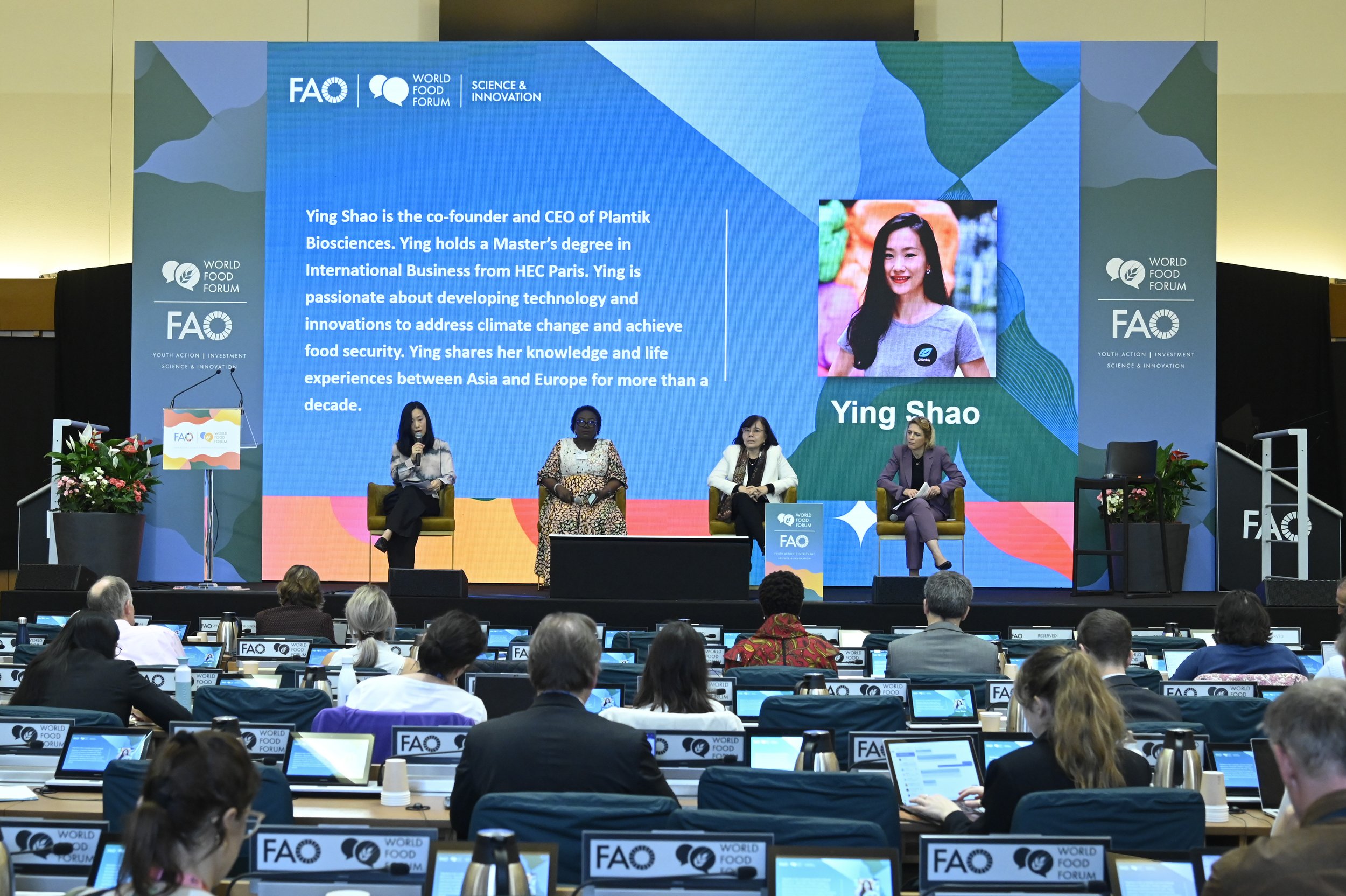Speech Delivered at the FAO World Food Forum in Rome - Oct. 17, 2024
How can genome editing be leveraged to develop more resilient crops and enhance the resilience of our agrifood systems?

“My name is Ying Shao, I’m the co-founder and CEO of Plantik Biosciences, an ag-biotech startup based in France. At Plantik, we are developing plant engineering technologies to create climate-resilient crops faster. I’m honored to be addressing this important question today.
First, how do we define agricultural resilience?
Agricultural resilience can be defined as the ability of agrifood systems to withstand and rapidly recover from external shocks. Natural hazards, including extreme weather events brought by climate change, represent a group of significant shocks that threaten agricultural resilience. These events, in particular, heat waves, droughts, and extreme rainstorms cause substantial crop losses. The forecasts for these extreme weather events are particularly alarming for certain regions of the world, such as South and Southeast Asia, where record-breaking heatwaves in recent years were made 30 times more likely as a result of climate change.
India is a striking example, having endured consecutive record-breaking heatwaves in the last three years, with temperatures soaring up to 50 degrees Celsius across various regions in 2024. As a result, the production and yield of tomato crops, of which India is the second-largest global producer, can be reduced by up to 75% due to such heat stress. These impacts highlight the urgent need for developing more climate-resilient crops that can adapt and thrive under challenging weather conditions to ensure global food security and the livelihoods of millions of farmers, especially the food insecure people – over 75 percent of whom derive their livelihoods from agriculture.
Now, how can genome editing technologies be leveraged to develop more climate-resilient crops?
As addressed by the previous speakers, genome editing presents a transformative opportunity for creating improved plant varieties rapidly, saving a tremendous amount of time and cost. What is particularly promising is its potential to enhance complex underexplored traits due to previous technical limitations. Heat tolerance is an example of such complex traits which involves multiple stress response mechanisms and may vary significantly from plant to plant and from one species to another.
Recent technical developments in genome editing technologies especially the CRISPR/Cas systems made repeated experiments more accessible. In addition, other disruptive technologies can be leveraged to enable the power of genome editing further in order to engineer these complex and important traits.
At Plantik, we utilize and develop three key technologies in particular to address the major bottlenecks in applying genome editing in plant breeding:
The first two are machine learning and cloud computing, and they work hand in hand. These tools enables us to analyze, compare, and predict the most relevant targets in the genome for generating a specific trait. we are now able to, for the very first time, engineer the underexplored regions in the genome, or the “dark genome”, to develp complex traits effectively and without unwanted side effects.
The third technology is new plant transformation methods to deliver DNA into various plant cells or tissues using a combination of functional nanomaterials and microfludics.
These technologies combined offer an exciting opportunity to scale the genome editing operations to different plant varieties and species quickly and in a cost-effective way. This is particularly promising for enhancing adapted traits in neglected and underutilized crop species, and especially in marginalized geographies. In addition, the genome editing systems offer the possibility to combine multiple targets in a single editing event, enabling the prospect of rapid and significant improvements in these species.
Now, how does this technological advantage translate into real-world results?
By modifying small and precise targets in the underexplored “dark genome”, we developed heat-resistant tomatoes that could transform lives. These tomatoes are estimated to save up to 40% of yield loss under representative simulated heat waves. To put this into perspective, at current production levels in India, the world’s second largest tomato producer, our heat-resistant tomatoes could save about 8 million metric tonnes of tomato yield. 8 million metric tonnes, that is the equivalent of the total annual production and therefore the entire livelihood of around 300,000 small and marginal farmers. What is even more important is that we’ve achieved these proofs-of-concept in less than 24 months, compared to conventional methods that could take as many as 8 years.
So, as a small-sized innovator in the space, what can we do to help ensure the inclusivity of these innovations for small-scale producers?
We believe that startup and SME players in the field are uniquely positioned to democratise genome editing technologies thanks to our agility, and especially by extending the use of these technologies on niche crops and addressing developing markets. At Plantik, we are able to adapt our work in tomatoes to emerging, high potential food crops like quinoa. Geographically, we're focusing on regions most affected by climate change, such as South and Southeast Asia, where farmers have fewer resources to adapt to extreme weather conditions themselves.
As a smaller player, we cannot realize our mission and contribute to more resilient agrifood systems without the help of other stakeholders such as policy makers, public funders, and private investors. Platforms like the World Food Forum is crucial to faciliate conversation and exchange between the stakeholders and make sure valuable innovations are supported and valorized. And on that note, I will end my talk today. Thank you all for listening.”
Watch the recording of the full session below:
